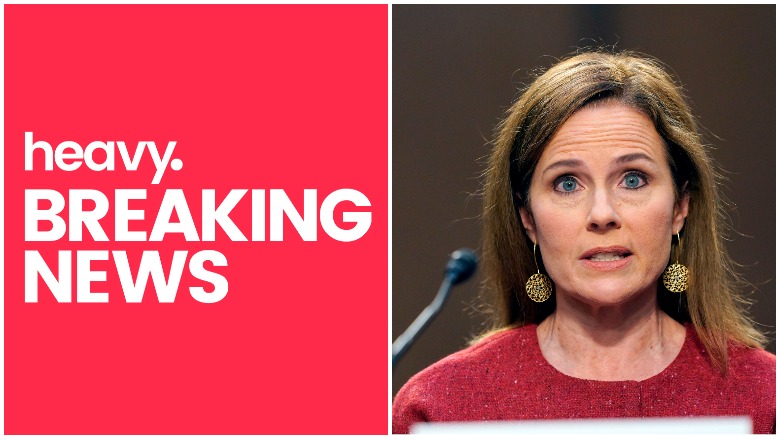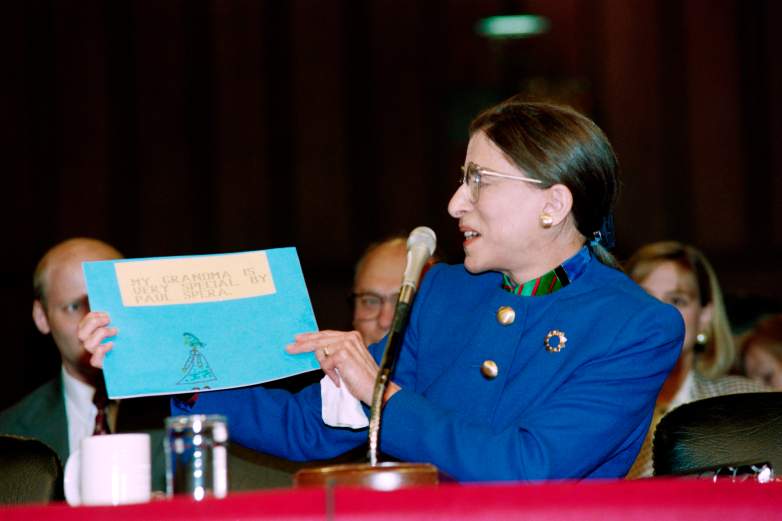
Getty/Susan Walsh Amy Coney Barrett, in Day 2 of her Supreme Court confirmation hearings, refused to answer if she would vote to overturn Roe v. Wade.
Judge Amy Coney Barrett, in Day 2 of her confirmation hearing to take the late Justice Ruth Bader Ginsburg‘s seat on the Supreme Court, refused twice to commit to a position on whether Roe v. Wade, the 1973 decision that enshrined a woman’s right to an abortion, was wrongly decided.
Here’s what you need to know:
Feinstein Called it ‘Distressing’ That Barrett Would Not Say if She Believed Roe v. Wade Was Wrongly Decided, a Question Ginsburg Did Answer in Her Confirmation Hearing
California Democratic Senator and Ranking Senate Judiciary Committee Member Dianne Feinstein told Barrett that, during her 1993 confirmation hearing, Ginsburg answered a question about Roe v. Wade by saying that if a government controls a woman’s choice whether or not to bear a child, she is “treated less than a fully adult woman who is responsible for her own choice.”
Ginsburg was praised for her forthrightness by longtime conservative Senator Orrin Hatch, Feinstein added.
She also noted that in a dissent, late Justice Antonin Scalia said outright that Roe was wrongly decided and should be overruled. “Do you agree with Justice Sca;ia that Roe was wrongly decided?” Feinstein asked.
Barrett twice declined to answer the question, invoking words of Justice Elena Kagan, in which she said she would avoid giving a “thumbs-up or thumbs-down” to specific precedents.
“It would be wrong in terms of canon for me to do that as a sitting judge,” Barrett said. “It signals to litigants that I might tilt one way or another on a pending case.”
Feinstein said, “On a major cause, with a major effect on more than one-half the population of the country, on women, it’s distressing not to get a straight answer. So let me try again.”
Barrett again declined to answer.
“I completely understand why you are asking the question, but again, I can’t pre-commit and say I’m going in with some agenda, because I’m not,” she said.
Ginsburg Was Actually on a Case in Which She Argued a Female Air Force Captain, Told She Would Be Discharged if She Didn’t Have an Abortion, Should Have the Right to Bear Her Child

Getty/Jennifer LawSupreme Court nominee Ruth Bader Ginsburg holds up a book entitled “My Grandma is very special” written by her grandson, Paul Spera, on July 20, 1993, during her confirmation hearing.
Despite Ginsburg’s long history of defending a woman’s right to choose, the 1993 quote Feinstein referenced actually came during questioning on a case in which Ginsburg believed that a female Air Force captain should have the right to bear her child rather than have an abortion or risk discharge from the Air Force.
The case, Struck v. Secretary of Defense, involved Captain Susan Struck, who became pregnant in 1970 while on tour in Vietnam. She was ordered by a Board of Officers to be honorably discharged, because she refused to have an abortion.
Ginsburg, working for the American Civil Liberties Union, represented Struck before the 9th Circuit Court, according to the case text. That court upheld the Air Force’s order, but as Ginsburg and the ACLU prepared to appeal it to the Supreme Court, the Air Force relented, USA Today reported.
Roe v. Wade was decided two years later.
Ginsburg’s 1993 comments on the case, in part, went like this, per The New York Times’ 1993 reporting:
In that case, all three strands were involved: her equality right, her right to decide for herself whether she was going to bear the child, and her religious belief. So it was never an either-or or rather. It was always recognizing that the one thing that distinguishes women from men is that only women become pregnant. And if you were going to subject a woman to disadvantageous treatment on the basis of her pregnant status, which was what was happening here, you were going to deny her equal treatment under the law.
…
But you asked me about my thinking about equal protection versus individual autonomy, and my answer to you is it’s both. This is something central to a woman’s life, to her dignity. It’s a decision that she must make for herself. And when Government controls that decision for her, she’s being treated as less than a fully adult human responsible for her own choices.
Barrett’s confirmation hearing will continue throughout Tuesday, and will likely wrap on Thursday.
READ NEXT: Amy Klobuchar: ‘In the Name of RBG,’ Do Not Confirm Amy Coney Barrett